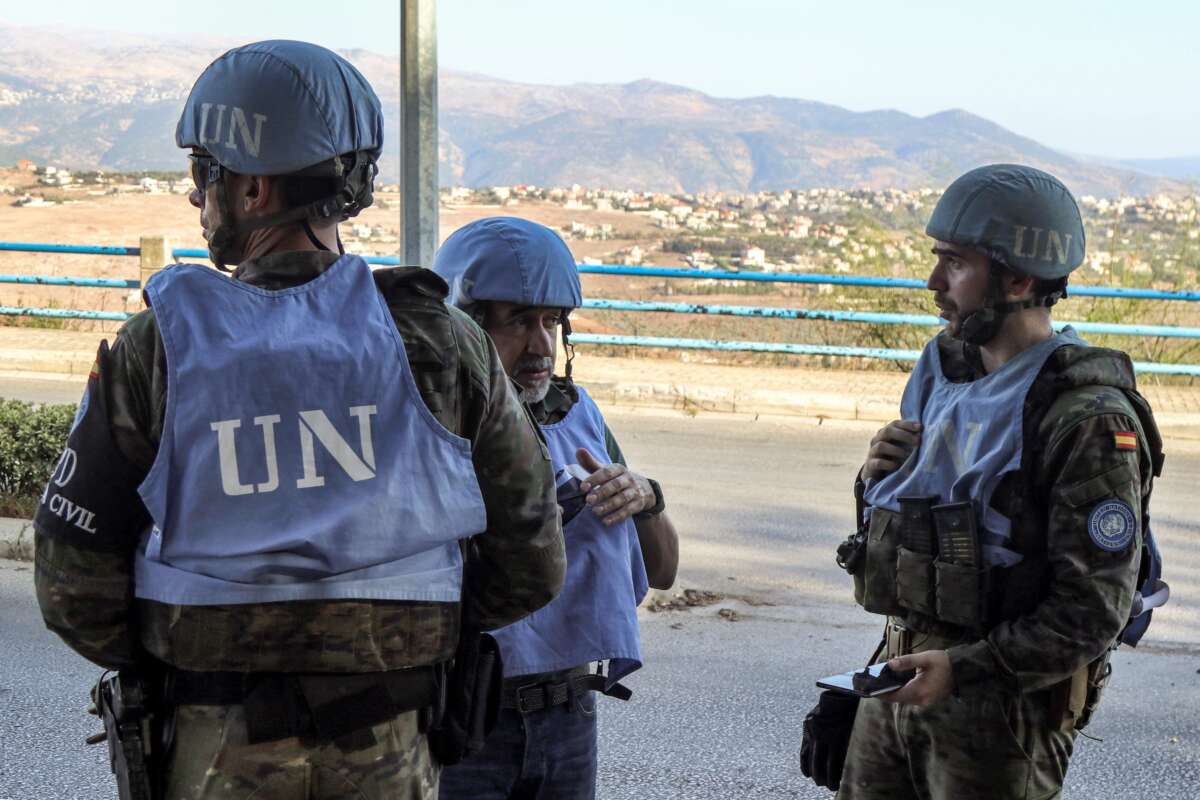Honest, paywall-free news is rare. Please support our boldly independent journalism with a donation of any size.
Israeli forces have attacked UN peacekeepers in Lebanon at least a dozen times in recent weeks, including one attack in which 15 peacekeepers were injured by white phosphorus, according to a new report.
The Financial Times says there have been a dozen Israeli attacks on UN Interim Force in Lebanon (UNIFIL) peacekeepers, damaging bases and wounding peacekeepers, according to a leaked report by a country that contributes troops to the peacekeeping force seen by the publication.
In one of these attacks, on October 13, Israeli tanks broke into one of UNIFIL’s bases. The tanks left after peacekeepers protested their presence, but shortly after, Israeli forces fired several rounds of white phosphorus 100 meters away from the base.
The attack wounded 15 peacekeepers, according to the report. UNIFIL similarly reported on Telegram last week that peacekeepers had been wounded by the attack, suffering from skin irritation and gastrointestinal symptoms. Israeli forces claimed they had deployed the white phosphorus as a smokescreen.
It is illegal to use white phosphorus in populated areas, as the caustic chemical can cause extreme harm in the short and long term. The chemical can burn through clothes, skin and bone, and causes severe damage to the eyes and respiratory system when inhaled. It can also damage the liver, heart and kidney through skin contact and exposure.
Israeli forces have used white phosphorus on southern Lebanon multiple times in the last year. In June, Human Rights Watch documented at least 17 incidents in which Israeli forces used white phosphorus on municipalities, including residential areas, injuring at least 173 people. In at least one incident, Israeli forces used white phosphorus shells manufactured in the U.S.
UNIFIL has said that Israel’s persistent attacks on its peacekeepers are “a flagrant violation of international law.” The peacekeeping force was established in response to the Israeli occupation of southern Lebanon in 1978, with troop contributions from 50 countries, and analysts have said that Israeli forces are attacking them now in order to limit outside documentation of Israel’s massacres in the region.
Israeli forces have directly hit UNIFIL infrastructure, indicating intent to attack the peacekeepers despite Israel’s insistence that it is not deliberately targeting the group. Israel’s repeated threats against UNIFIL and insistence that peacekeepers evacuate their bases are also evidence of intent.
Multiple peacekeepers have been injured in other attacks, including one on October 10, in which an Israeli tank fired at an observation tower and injured two peacekeepers.
Most recently, on Sunday, UNIFIL reported that an Israeli bulldozer destroyed an observation tower and perimeter fence of another UN position. The attack was deliberate, the group said. Just the day before, UNIFIL reported that peacekeepers at one camp, in Meiss ej Jebel in south Lebanon, ran out of water as Israeli military activities had blocked roads for weeks.
Troop contributing countries have criticized the Israeli military’s aggression against the peacekeepers. In one statement earlier this month, 40 countries said that they “strongly condemn” the attacks and that UNIFIL’s mission of protecting civilians in south Lebanon is “particularly crucial in light of the escalating situation in the region.”
Some U.S. officials, however, have waved away the concerns. In response to a question about the white phosphorus attack at a news briefing on Tuesday, Pentagon press secretary Pat Ryder said nothing of the injuries to the peacekeepers, saying only that white phosphorus has “a legitimate use in combat.”
The Financial Times report has spurred fresh condemnation of Israel’s attacks on peacekeepers, which, if deliberate, are war crimes.
“Israel is behaving like a rogue state, attacking UN facilities and injuring peacekeepers,” said Center for International Policy Vice President for Government Affairs Dylan Williams. “These are serious violations of international law that UN member states must ensure they’re not enabling. It’s yet another reason why Biden must halt offensive weapons shipments to Israel.”
Speaking against the authoritarian crackdown
In the midst of a nationwide attack on civil liberties, Truthout urgently needs your help.
Journalism is a critical tool in the fight against Trump and his extremist agenda. The right wing knows this — that’s why they’ve taken over many legacy media publications.
But we won’t let truth be replaced by propaganda. As the Trump administration works to silence dissent, please support nonprofit independent journalism. Truthout is almost entirely funded by individual giving, so a one-time or monthly donation goes a long way. Click below to sustain our work.
